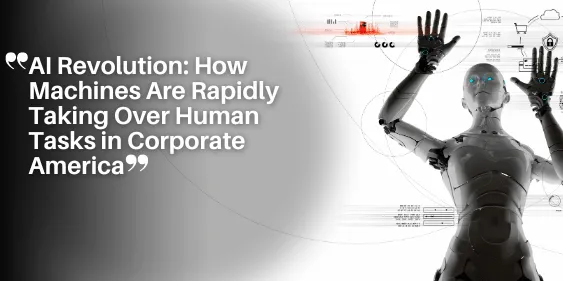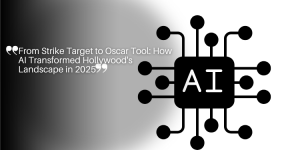AI Revolution: How Machines Are Rapidly Taking Over Human Tasks in Corporate America

Artificial intelligence is becoming the linchpin of transformative strategies in Corporate America. A staggering 61% of large U.S. companies plan to roll out AI solutions within the next year.
This adoption isn’t just a nod to staying current; it’s a strategic pivot aimed at automating financial transactions and complex report generation.
Automating Financial Transactions
AI’s role in automating financial transactions cannot be overstated. From paying suppliers to processing invoices, AI systems are taking over these traditionally labor-intensive tasks, leading to significant efficiency gains.
This automation not only cuts down on human error but also speeds up processes, ensuring that financial operations run like a well-oiled machine.
Complex Reporting Tasks
When it comes to intricate financial reporting, AI shines by handling data-heavy tasks that would typically require substantial man-hours.
These systems can compile, analyze, and report financial data swiftly and accurately, freeing up human employees to focus on more strategic and less monotonous activities.
Streamlining Processes and Enhancing Productivity
Companies are strategically leveraging AI to streamline various operational processes.
This isn’t just about making things faster; it’s about redesigning workflows to be more efficient.
By integrating AI, businesses can reduce costs and enhance productivity.
This move is essential for maintaining a competitive edge in an increasingly fast-paced market.
With these advancements, the AI revolution is setting the stage for pivotal changes in how businesses operate, fundamentally transforming corporate America’s landscape.
AI’s Expanding Role in Creative Endeavors
AI Tools for Job Postings and Marketing Campaigns
Today’s Corporate America is witnessing a surge in the application of AI tools in creative fields.
Among the most transformative applications are AI tools like ChatGPT.
These tools are making waves by efficiently crafting job postings, writing press releases, and even devising engaging marketing campaigns.
By analyzing vast datasets, AI can identify trends that humans might overlook, thereby suggesting targeted and effective content.
AI as a Creative Collaborator
The capabilities of AI extend beyond mere automation of rudimentary tasks.
AI is now a bona fide collaborator in the creative process, augmenting human potential.
It can generate various creative texts such as poems or scripts, providing an initial draft that humans can refine.
This collaboration is a testament to AI’s ability to boost human creativity by handling the grunt work, thus allowing human minds to focus on more strategic and nuanced tasks.
Data-Driven Content Creation
One of AI’s standout abilities lies in its potential to analyze data and suggest targeted content creation.
It can sift through immense volumes of data to draw insights on consumer preferences and market trends.
Such insights can help businesses tailor their content to the right audience, thereby enhancing engagement and effectiveness.
The result is a more personalized and data-driven approach to creative endeavors, which is transforming the way businesses communicate with their audiences.
As AI continues to embed itself in these creative processes, it does more than just automate—it elevates the entire creative workflow.
Embracing AI in these areas not only helps enhance productivity but also opens up new avenues for innovation and expression.
Economic Implications of AI Integration
AI Moderating Costs Amid Economic Uncertainties
As businesses navigate through the rough seas of economic uncertainty, AI has surfaced as a reliable anchor for moderating costs.
From automating routine financial transactions to streamlining complex reporting tasks, AI is swiftly becoming an indispensable tool for CFOs.
For companies already grappling with fluctuating markets and inflation, AI’s ability to automate and optimize processes offers a beacon of hope.
According to a survey presented by Duke University and the Federal Reserve Banks, there is cautious optimism among firms that have embraced AI.
AI-driven efficiencies promise not only to stabilize costs but also to potentially counterbalance the trajectory of price increases.
By leveraging AI technologies, businesses are finding novel ways to enhance productivity without necessarily increasing expenditures.
Cautious Optimism About Mitigating Inflationary Impacts
Inflation remains a looming threat to the global economy, but companies integrating AI technology are turning this challenge into an opportunity. The CFO Survey indicates a level of cautious optimism among chief financial officers, who believe AI could help mitigate some of the adverse impacts of inflation.
This belief is not unfounded. AI technologies can analyze massive datasets in real-time, offering insights that lead to smarter, quicker decisions.
Whether it’s optimizing supply chains or predicting market trends, the intelligence gathered by these systems can help companies navigate the volatile economic landscape more proficiently, thereby potentially stabilizing inflationary pressures.
Strategic Imperative for Competitive Edge
The necessity for businesses to adopt AI goes beyond mere economic survival; it’s about staying ahead in an increasingly competitive market. John Graham, a finance professor at Duke University, underscores the strategic imperative for companies to embrace AI innovations.
He cautions that firms failing to integrate AI risk falling behind their more tech-savvy competitors in terms of both operational efficiencies and innovations.
Given the rapid pace of technological advancements, neglecting AI is not an option for any company aiming to maintain or enhance its market position.
AI’s potential to streamline operations, reduce costs, and drive innovation makes it a critical component of any forward-thinking business strategy.
AI-driven efficiencies and cost-moderation capabilities won’t just make companies more resilient in today’s economic climate; they’ll set the stage for sustainable growth and competitiveness.
By embracing AI, corporations are setting the stage for a significant evolution in their business models, providing valuable insights into future opportunities and challenges.






